写作教程第2版课件u4
- 格式:ppt
- 大小:1.08 MB
- 文档页数:24

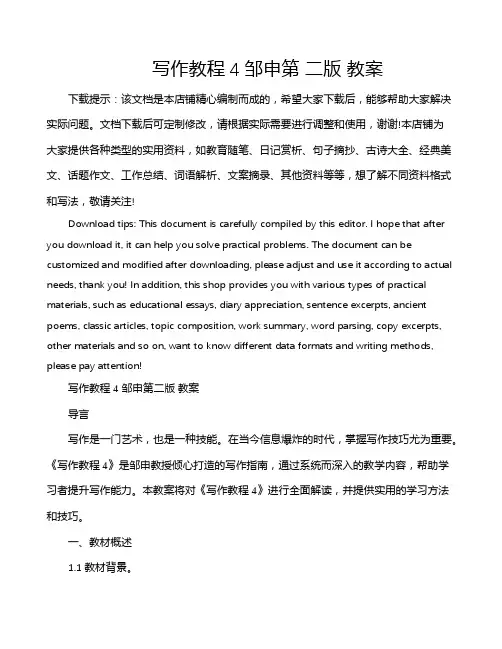
写作教程4 邹申第二版教案下载提示:该文档是本店铺精心编制而成的,希望大家下载后,能够帮助大家解决实际问题。
文档下载后可定制修改,请根据实际需要进行调整和使用,谢谢!本店铺为大家提供各种类型的实用资料,如教育随笔、日记赏析、句子摘抄、古诗大全、经典美文、话题作文、工作总结、词语解析、文案摘录、其他资料等等,想了解不同资料格式和写法,敬请关注!Download tips: This document is carefully compiled by this editor. I hope that after you download it, it can help you solve practical problems. The document can be customized and modified after downloading, please adjust and use it according to actual needs, thank you! In addition, this shop provides you with various types of practical materials, such as educational essays, diary appreciation, sentence excerpts, ancient poems, classic articles, topic composition, work summary, word parsing, copy excerpts, other materials and so on, want to know different data formats and writing methods, please pay attention!写作教程4 邹申第二版教案导言写作是一门艺术,也是一种技能。

《写作教程》第二版(小教)教案-图文教课程名称:任课教师:教学单位:师教案《写作教程》 1课程教学基本信息课程名称任课教师授课对象授课时间写作教程总学时数职称初1304-初1307班 34 理论学时 28 实践学时 6 2021年上学期本学期使用的教材《写作教程》第2版,尹相如主编。
本教材是高等院校小学教育专业中文方向必修课,配套有国家精品课程。
配套教材曾被教育部评为全国教师教育优秀课程资源,并获云南省优秀社科成果奖。
本教材要从现代社会的需要出发,并以语文作文教学为参照系确定教学内容,抓好讲、读、写三个环节,做到“讲练一体,读写结合”:讲清写作的基本概念和基础理论,使学生切实掌握写作的规律和特点;指导学生认真阅读典范文章,在头教材分析脑中建立起写作范式;进行有目的、有计划的写作训练,促使学生把写作理论转化为写作技能。
内容分为上下三部分:上编为写作基础,包括写作原理、写作主体、写作过程和网络写作;中编为写作文体,包括文学写作和实用写作;下编为写作教学。
教材内容涵盖了小学教育专业学生应该掌握的写作基础知识和各种能力训练。
“以写为主,以讲促写,读写结合,讲练一体,纸质教材与课程网站相互沟通”的立体化教材构架,是本课程的特色。
学情分析本教材的学习对象是小学教育专业五年制大专四年级的学生,学生基础相对良好,经过数年的学习与磨合,学生的学习态度及方法都有了一定转换和完善。
因此,教学中可以按照循序渐进、因材施教的原则,灵活地进行教学。
在教学中,就借助各种教学媒体、多种教学手段,力争最大程度地激发学生的学习兴趣,培养良好的学习习惯,提高合作学习、探究式学习的能力。
注重主体性和实践性,尤其不能忽视对学生的语言表达能力和写作能力的培养。
总体目标丰富学生的语言积累,培养语感,发展思维,使学生具有适应实际需要的理论水平和实际写作能力,正确理解和运用祖国的语言文字;提高学生的道德修养和审美情趣,促进德、智、体美诸方面的和谐发展。
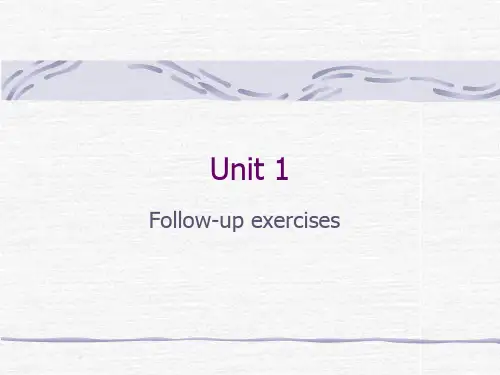
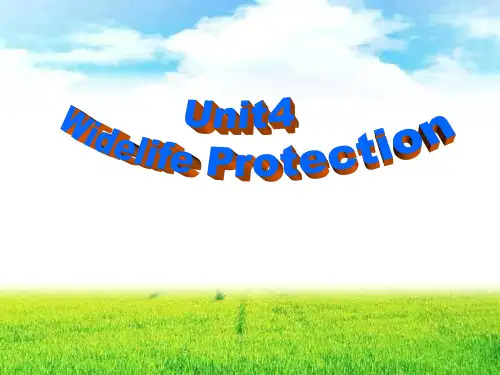
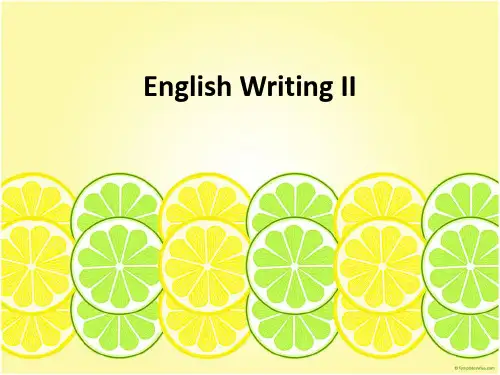

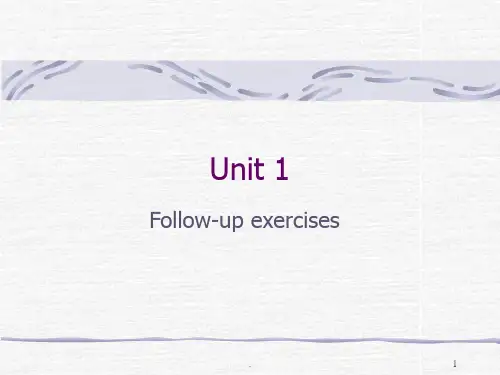

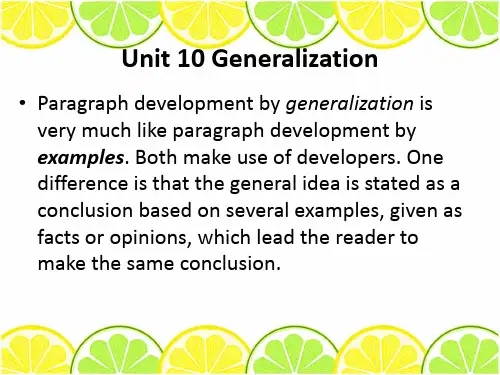
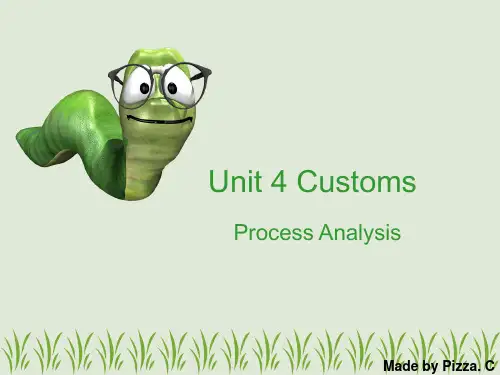
写作教程第二版(邹申)写作教程第二版(邹申)-unit 7Unit 7Social ProblemsBy Pizza. C写作教程第二版(邹申)-unit 7Unit ObjectivesDefinition of cause effect Function of cause effectFeatures of cause effectOrganization of cause effectHow to choose right examplesTransitional phrasesBy Pizza. C写作教程第二版(邹申)-unit 7Warm-up Activities--- college students’ taking part-time jobs1. short of pocket money 2. relieve financial burdens Reasons3. offer help to some fellow students who are in financial difficulties4. prepare for jobs in the future1. have to spend precious study time in finding or doing part-time jobs 2. lose interesting in learning 3. may do good to academic studies 4. gain experience or knowledge that cannot be obtained from booksBy Pizza. CResults写作教程第二版(邹申)-unit 7Definition of cause effectSound reasoning or logic is naturally the most important quality of any analysis. In presenting cause and effect, we should try to be objective. Overstating or understating our position would only make the analysis unconvincing. It seems convenient to state the effect first and then explain the causes. The reverse order, however, is to be preferred when one cause leads to various effects. 1. To state an effect and devote the rest of the paragraph to examining the causes. 2. To state a cause and then mention or predict the effect.By Pizza. C写作教程第二版(邹申)-unit 7Function of cause effect1. Cause and effect serves as a useful means to describe or analyze phenomena, problems, influences, etc. 2. We often find ourselves in situations where we need to discuss causes or effects in order to better understand what is being discussed: places, people, features, advantages or disadvantages. 3. How to express cause-and-effect relationships effectively is crucial to meaningful communication.By Pizza. C 写作教程第二版(邹申)-unit 7Features of cause effectCause 1 Effect Cause 2 CauseEffect 1Effect 2 Effect 3By Pizza. C写作教程第二版(邹申)-unit 7Fill out the forms with the appropriate and relevant informationLike English in high schoolbe easy to find a job after graduationhave an uncle who once majored in English be good at language learningless income employers do not like it save energymore free timeBy Pizza. C写作教程第二版(邹申)-unit 7Study the following words and phrases and divide them into the following 2 groups.now that, the reason for, thanks to, becausesince, as, due to, because of, owing toconsequently, therefore, so, as a result, thusit follows that, accordingly, hence, so thatBy Pizza. C写作教程第二版(邹申)-unit 7Sample 1- P67 Questions 1. This paragraph is developedaround the problem of “the lack of parking” complained about by US city residents. 2. Single effect and multiple causes. In this way, thewriting shows a logical cause-and-effect pattern, whichmight consequently attract more concern or efforts in the problem’s solution. 3. The 3 causes are presented from the most direct to the most indirect.By Pizza. C写作教程第二版(邹申)-unit 7Causes 1. ______________________________ 2. More cars are constantly produced. 3.Both city governments or governmental ______________________________agencies have financial headachesEffectLack of parking in citiesOver a million cars are abandoned on the streets.Superficial / direct Deepest / indirectBy Pizza. C写作教程第二版(邹申)-unit 7Sample 2 P68 Questions 1. The problem addresses refers to the issue of terrorist attacks. This issue has brought about at least three major aspects of consequence or effect. 2. The paragraph addresses the cause rather than effects right at the beginning. 3.No. It follows a pattern of single cause and multiple effects. Unlike Sample 1 in which effect is addressed first and causes are traced backwards, Sample 2 states briefly at the beginning the issue of terrorist attacks as a direct cause, and then dwells upon three major effects, some factual and some predicted.By Pizza. C 写作教程第二版(邹申)-unit 7CauseEffects1.The Americans feel very anxious and panicky.The terrorist strikes2. The government trends to make political errors.3. The public would wind up ignoring the one warning that really matters.By Pizza. C写作教程第二版(邹申)-unit 7CauseLack of regulationEffect-causeEffectsTiger’s power / beauty / mysteryTigers privately kept as pets in TexasLots of undertrained tiger ownersDisasters happening to childrenNeglect of commitment abandonmentBy Pizza. C写作教程第二版(邹申)-unit 7Cause / ReasonEffect / Impact…may be among other reasons … is the net result Transitional phrases Thanks to… It leaves some serious Account / find some reason for consequences. Linking phrases for causerise to a host of It may give / effect Attribute A to B problems. Be due to several factors The effect Be partly caused by… Just as… is… is evident. immediate result it produces Be precisely why… The resultThethat… is is… Why…? For one thing… … is precisely influence has not been The why… To stem from the fact that… confined to … …may be among other reasons To view…as a response to… The result is that… … factors weigh heavily for… There are a number of effects. Another im portant reason is… bring about… cause a sweeping change exert a profound influence That’s the reason why… Result in …By Pizza. C。
Unit 4 Text A Turning failure into successI. Teaching Objectives1. Understand the audio materials of this unit.2. Grasp the key words , phrases and structure.3. Master the skills of writing and reading in this unit.A) An Effective Way of ArgumentationB) Reading between the linesII. Teaching Content1. Lead-in Activities2. Text Organization3. Skill Learning in Writing and Reading4. Language Points (key words, phrases and difficult sentences)5. Grammar Focus (“as if” )6. Guided Practice ( exercises, oral practice and group work )III. Teaching Process1. Warm-up Questions/ActivityIntroduction remarks:What is success? Some people seem to sail easily through life, overcoming every obstacle they encounter with ease. Then there are those manage to avoid most difficulties, by limiting their experience to what’s familiar and easy, and never trying anything new. Are these people successful? Should we all envy them, admire them, imitate them? The texts in this unit take a different approach to success. Text A looks into the psychology of success, and comes to the conclusion that one of the most essential ingredients in success is---failure!Questions:What kinds of people are successful? List some successful people. Did they all sail through life easily?Is success necessarily good? What kinds of success can be harmful ?Can you recall any failure that upset you? What effect did that failure have on you?What have you learned from failure ? Is failure necessarily bad?How can we turn failure into success?(people who have a lot of money, have an important orpowerful job, have a happy family life; famous actors, singers; famous politicians, scientists…)---No, certain kinds of success are damaging or destructive.What are they according to the text? 1. Success that comes too early 2. Success that comes too easily 3. Success that is achieved at the cost of the total quality of an xperience. Never pleasant, a natural feeling of disappointment , A nervous breakdown, Feeling depressedWhat can we learn from failure? We can learn to face defeat with courage.A failure can prompt fresh thinking, a change of direction, We can learn to use it to make a positive contribution to our life.Is failure necessarily bad? No, what you have learned from failure will lead you to success. In the long run, it may prove beneficial.How can we turn failure into success ?2. Text OrganizationThe text can be divided into 5 parts:Part One.(para1) Beginning --- introduce an extreme example of a common henomenon of failurePart Two.(para2-7) Development ---it is wrong to assume that any failure is bad and any success is good.Part Three.(para8-10). Further development --- the reason why so many people are so afraid of failurePart Four.(para11-14). Solution --- how to learn to use failure so that it makes a posotive contribution to our live.Part Five.(para15) Summary and a final touch --- Nobel failure is a special heroism3.Skill learning in writing and readingA). Effective Way of ArgumentationFirst to present a viewpoint Then argue against it by presenting another point of view with supporting ideas ( Examples :para 2 and 3 )B) Reading between the linesReading between the lines means drawing inferences about the author’s ideas from what is written and from what is not written.Although it’s tricky — rather like detective work! —you may discover the author’s real meaning by using context clues, common sense and our knowledge of the world — by connecting ideas and drawing conclusions — by forming and testing ideas about what the author was trying to say.As you read the text the first time, use context clues, common sense and your knowledge of the world to speculate about the possible answers to the questions between the paragraphs, and note your ideas in pencil (in Chinese or English) in the margins. Keep checking and modifying your ideas as you read further.4. Language Points1). voted "Most Likely to Succeed" in college ---chosen in college for the title of "Most Likelyto Succeed" by students who votedvote ----(esp. passive) declare sb./sth. to be good, bad, etc. by general consentExamples:The show was voted a great success.The children all voted the trip the best they had ever had.2). It was panic. ----The fact (that I was fired) caused uncontrollable fear (in me).panic ----n. a feeling or state of sudden uncontrollable and quickly spreading fearExamples:He got into a panic about examinations.The thought of flying alone filled me with panic.There is a strong likelihood of panic if a fire starts in the building.3).... I had no experience in coping with rejection. ----. I had never experienced a denial and didn't know what to do with it.rejection ----n. the act of refusing to grant or the state of being denied of (a request, demand, etc.) Examples:I've applied for ten jobs, but all I've got is rejections.He did not ask her to marry him out of fear of rejection.cope with ----(See Note 9 deal with)4). a failure ----a person, an attempt or a thing that failsExamples:He is a failure as a teacher.I'm a bit of a failure at painting.The meeting/project was a complete failure.5). Vicky's reaction is an extreme example of a common phenomenon. ----Such feelings people have (when rejected) are very common, but in Vicky's case they are especially serious and unusual.6). place emphasis on "making it" ----give special importance to "being successful"7). what we don't always recognize ----what we sometimes fail to seeIn the statement, the scope of negation extends from the negative word "not" itself only to the adverbial "always" rather than to the verb "recognize", i.e. only the adverbial is within the stretch of language over which the negative meaning operates.Examples:He is not always at home in the evening (= He's often at home in the evening, but not always). Things do not always go right (= Things normally go right, but not always).8). in the long run ----eventually; in the endExamples:It pays to buy goods of high quality in the long run.Studying may be difficult just now, but you will benefit in the long run.Physical exercises will be for your health in the long run.9). a job dealing with people ----a job that involves handling human relationsdeal with sth. ----handle or attend to sth. (usu. sth. that needs attention or concern)Examples:Haven't you dealt with that letter yet?The Finance Officer deals with all the finances of the university.Cf. cope with sth. ----deal with sth. successfully (usu. sth. difficult or unpleasant that one must accept or endure)Examples:We must try to cope with our own failure.Poor families have to cope with a lot of problems.10). a copy editor ----an editor of written material11). People are generally prone to what language expert S. I. Hayakawa calls "the two-valued orientation". ----People generally tend to look at things as having only two values, or two sides: anything that is not good must be bad, that is not true be false ----this two-valued logic is called "the two-valued orientation" by Hayakawa.orientation ----n. a usu. general and lasting direction of thought, interest or viewbe prone to ----be likely to ( sth. or do or suffer from sth., esp. sth. bad or harmful)Examples:He is prone to lose temper when others disagree with him.Kids are all prone to eat junk food.My sister is prone to flu.12). ..., infinite degrees of both are possible. ----... there can be many, many different levels ofboth success and failure.13). a world of difference ----a great deal of differencea world of ----a large amount of; lots ofExamples:There's a world of difference in the performance of the two cars.That experience gave him a world of good.There is truly a world of difference between the old Chinese society and the new.14). Indeed, the words failure and success cannot be reasonably applied to a complex, living, changing human being. ----It is certainly unfair just to call someone a failure or a success, for a human being is a complex, living thing that keeps changing.apply to ----use (a particular word or name) to describe (sth. or sb.)Examples:I'd never apply the word "readable" to any of his books.The term "mat" can be applied to any small rug.15). In fact, success in one area often precludes success in another. ----In fact, someone who is successful in one area is often prevented from achieving success in another area.preclude ----vt. make sth. impossibleExamples:These conditions preclude us from joining in this event.Age alone will not preclude him from standing as a candidate.This contract does not preclude my being employed by others at the same time I am working for you.16). even when I'm home ----even when I don't travel; even when I'm in my own country home ----ad. at, in or to one's home .or country17). marked her as "Olympic material" ----distinguished her as a potential Olympic athlete mark as ----be a distinguishing feature of... asExamples:These qualities mark the film as exceptionally good.Hard work has marked Asian Americans as a model minority.material ----n. someone who is good enough for a particular job or position18).1 never prepared myself for anything but the ice,... ----I set my mind to a career on the ice and nothing else,...prepare oneself for sth. ----make oneself mentally or physically ready to expect sth.19). distinguish oneself ----deserve to be noticed by doing sth. very wellExamples:He distinguished himself in the debate.She distinguished herself in British theatre at a very early age.McEnroe first distinguished himself by winning a junior tournament at Wimbledon.20). it's achieved at the cost of the total quality of an experience ----it (success) is achieved at the price of losing the complete worth of something one is doingat the cost of---- involving the loss ofExamples:He saved the children from the fire at the cost of his own life.The poor fox escaped from the trap at the cost of a leg.21). become obsessed with grades ----become too much concerned about one's performances on tests and exams22). They never branch out into tempting new areas, because they don't want to risk their grade-point average. ----They always stick to what they are learning and never try anything new and interesting because they don't want to do anything that may result in a lower GPA.branch out ----extend or expand one's activities or interests into another direction; begin doing other things alsoExamples:The bookstore has decided to branch out into selling records and tapes.She's leaving the company to branch out on her own.First Jim collected stamps; then he branched out and collected coins, too.23). no one tells us how to fail so that failure becomes a growing experience ----no one tells us beforehand how to cope with failure so that we can learn something from ita growing experience ----a learning experience24). Faihire is part of the human condition ----failure is one of the things that human existence depends on25). shielding their children from the knowledge that they have failed ----protecting their children from knowing that they have failed26).make the honor roll or the baseball team----earn a place in the honor roll or become a member of the baseball team27). because it does = because it matters28). Resist the natural impulse to blame someone else. ----Do not be tempted by the instinctive desire to blame your failure on other people.29). a job I'd counted on ----a job which I had expected to get30).1 hadn't been rejected as a person ----I had not been denied of the job because of anything in my personality31). Success... is not nearly as good a teacher as failure. ----Success ... teaches you to perform better far less than failure does.not nearly ----far from; much less thanExamples:There is not nearly enough (= There is much too little) for all these people!They don't have nearly so many foods to choose from as we do.32). Even a failure that seems total can prompt fresh thinking, a change of direction.----Even what appears to be a complete failure can inspire new ideas or a change in your course of action. prompt ----vt. inspire or cause (a feeling or reaction)Examples:Her remarks were prompted by her worries about the future.The letter prompted thoughts of his distant home.What prompted you to do such a silly thing?a change of direction ----a change in one's mind about sth. or in the way of doing sth.33). turn down ----refuse to accept (sb. or sth. usu. an offer, request or invitation); reject Examples:She turned him down; she wouldn't marry him.Pauline has turned down offers from several different law firms.Why was I turned down for the job---- Is it because I'm a woman----34). Y ou haven't the body for it. ----You are not physically fit for it.35). the way to use failure is to take stock courageously ----the way to benefit from failure is to think carefully and form an opinion about it without hesitationtake stock (of) ----1) examine or evaluate what one possesses, what one needs, etc.Examples:It's time to take stock of your life and decide where you want to go.At the age of 25,1 began to take stock of my career so far.2) count exactly the items of merchandise or supplies in stockExamples:The grocery store took stock every week on Monday morning.The stores are closed so they can take stock of their inventory.36). My friend ... moved into dance therapy. ----My friend ... changed her career and took up dance therapy.move ----vi. change from one job, interest, etc. to another37). Though we may envy the assurance that comes with success, most of us are attracted by courage in defeat. ----Though we may admire the confidence that people gains from their success, most of us are impressed by the courage that people show when they fail.5. Grammar focus:a)“as if” used to introduce something unreal or unlikely to happenWhen “ as if” is used to introduce a clause of unreal or unlikely condition, the subjunctive mood is normally required;6. Guided Practice (exercises, oral practice and group work)1) SummaryA. Ask several students to retell the text by using their own words.B. Talk about the main idea or theme of the text.2). ExercisesA. Comprehension of the text(During the period of preview or discussions in class).B. vocabulary IV--VII(homework)C. Translation( on exercise-book)7. After-class AssignmentsWe’ve just learned an effective way of argumentation: first to present a viewpoint and then to argue against it by presenting another point of view with supporting ideas. Try the same thing as you write your own paragraphText B Failure---- No! Just Temporary Setbacks Language Points1. visit with sb. ----(AmE) talk socially with sb. on a short visit2. a tract house----a house in an area for real-estate development; one of many similarly designed houses built on a tract of land3. Then the bottom fell out. ----Then a financial collapse occurred.Examples:The bottom fell out of his world (= Life lost its meaning for him ) when his wife died.The bottom has fallen out of the market (= Trade has fallen to a very low level).4. I was determined that my children would not lose their home as I often had as a child. ----I made up my mind to earn money to make the monthly payment for the house so that my children would not suffer as I had often suffered when I was a child from not having our own house.5. Recession. ----It was a recession period.6. advertising space ----(part of) a page in a publication (as a newspaper) set aside for advertising7.every advertising prospect I had worked on ----every possible buyer of advertising space whom I had tried to persuadeprospect ----n. a possible or likely customer or clientwork on sb. ----attempt to influence sb.Examples:Can you work on the manager?He might accept our suggestions if someone works on him properly.8. My heart sank. ----I suddenly lost hope and began to feel sad.9. approach (sb.) ----vt. speak or write to (sb.), esp. for the first time in order to ask him to do sth. or find out his opinionExamples:We've just approached the bank for a loan.I'm going to approach my uncle to see if he will give me a job.10.1 smiled my best smile ----I tried my best to give a most pleasant smilesmile a ... smile ----give a (specified type of) smileExamples:She smiled a broad smile.I smiled a bitter smile.11.1 made it as far as the beautiful old soda fountain... ----I had only the strength to walk to the beautiful old soda fountain ...12. lose one's home ----no longer have one's own househome ----n. a house, an apartment, etc. in which one livesExamples:Homes for Sale!The family has three homes ----an apartment in town, a country house and a beach house.13. She took my marked issue of the newspaper... and carefully read... all the way through. ----She took the copy of the newspaper on which I had made marks ... and carefully read ... from beginning to end.issue ----n. one of a regular series of newspapers, magazines, etc.14.... Ruben was a darling man who bought from everyone. ----.. Ruben was a well-liked person and he bought advertising from everyone.。